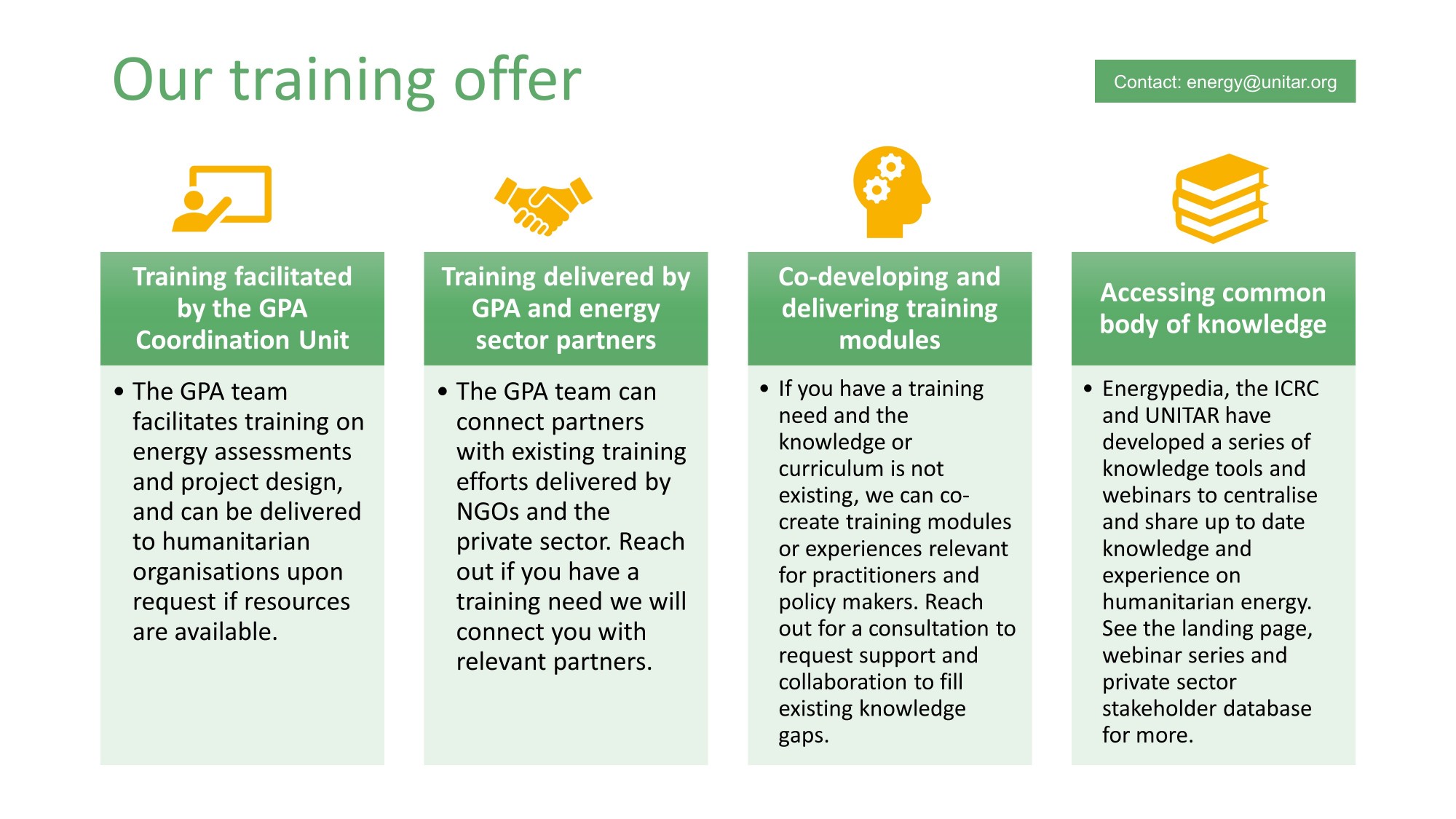In this section
In this sectionBackground
Technical expertise on sustainable energy for communities displaced by crisis and disaster is lacking within the humanitarian system, meaning that the energy needs of displaced and hosting communities as well as humanitarian operations are underserved. Through the GPA, we aim to consolidate a central training offer for all stakeholders working on energy in displacement contexts to build skills and capacities on this topic.
GPA Vision of Expertise and Skills Development on Humanitarian Energy
As outlined in the GPA Framework document, the vision for building capacity on energy within the humanitarian system is that each stakeholder involved in humanitarian relief has, in its own capacity, access to the knowledge and expertise necessary to provide sustainable energy solutions in displacement settings. This can be enabled by conducive institutional structures, the ability to access common repositories, exchange platforms and global discussion groups, the availability of professional training and the possibility to draw specialist help from external resources. Enabling factors to achieve this vision are:
- Institutional structures that enable in-house capacity for strategic energy programming are conducive to partnerships that draw technical expertise from outside the humanitarian sector;
- Tailored training packages in operational form to meet capacity and knowledge needs of each stakeholder;
- A common central knowledge-sharing and practitioner-connection platform specifically on energy for humanitarian settings; and
- Mechanisms to analyse and evaluate technical quality and effectiveness of energy-service delivery
Our Training Offer
Training and skills development opportunities are offered through the GPA through multiple avenues:
- Training facilitated by the GPA Coordination Unit
- Training delivered by GPA Partners
- Connecting partners with existing energy sector training
- Co-developing and delivering training modules
- Accessing a common body of knowledge
- Landing page
- Webinar series and video library
- Private Sector Stakeholder database

A key need identified through the GPA since 2018 is the lack of skills and guidance on how to develop sustainable energy projects that incorporate business models (I.e. to ensure financial sustainability of projects) and end user preferences into project design. Practitioners working in humanitarian settings are often limited by short term grant funding and focused on short term delivery of energy products to meet immediate energy needs, without engaging in energy product or service delivery through surrounding energy value chains and market systems existing locally, nationally and regionally. To address this, UNITAR, WFP and partners IIED, SELCO Foundation, MECS and NORCAP developed the flagship Energy Delivery Models training programme to develop capacities of humanitarian/development and energy sector partners on how to assess needs with communities and design energy access programmes that support local energy value chains and leverage public-private collaboration for long term sustainability of approach. To learn more about the pilot, the impact story can be found online here, and the e-learning and training material can be found online here.
To inquire further about training opportunities or ideas for collaboration, please contact the GPA Training and Capacity Development lead, Aimee Jenks (aimee.jenks@unitar.org).
- Energy Delivery Models (EDM) Training, UNITAR and WFP, 2021 - E-learning modules and tools to learn about the basics of energy access in displacement settings and how to co-design sustainable energy projects with end users.
- Training: Inclusive Energy Access 101, Mercy Corps, 2020 - Four-week course on the core concepts of energy and inclusion, and equipping learners with tools to address energy needs across the humanitarian world.
- Humanitarian Energy Landing Page - Centralised set of resources, case studies, tools, country information, and more for humanitarian energy.
- Humanitarian Energy Webinar Series - Series of knowledge events run from 2019-2022 on practical experiences and lessons from implementation.
- Humanitarian Energy Video Library - The webinar series is translated into 10-15 minute presentations and categorised by topic.
- Private Sector Database - List of companies and private partners working in displacement contexts.
Last updated: 25/07/2022
